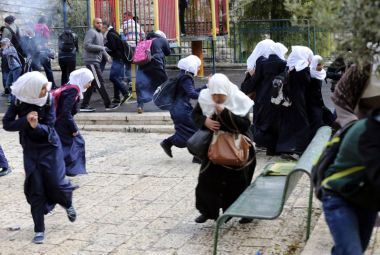Jordan-Israel relations in crisis over al-Aqsa mosque strife

Increasing strife over Jerusalem's most volatile holy site plunged relations between Israel and Jordan into crisis on Wednesday, with Amman recalling its ambassador for the first time since the countries' 1994 peace treaty.
In a sign of tensions, a Palestinian rammed his car into pedestrians in Jerusalem's city center on Wednesday, killing an Israeli paramilitary border policeman before he was shot dead by police. More than a dozen people were injured.
In a second attack later, a van driven by a Palestinian hit three soldiers in the occupied West Bank. One was seriously injured and two others suffered moderate wounds, an Israeli ambulance service spokesman and police said.
Security camera footage showed the large van plow into the three soldiers at speed. Police said the van escaped the scene and a search had been mounted.
The earlier car attack in Jerusalem occurred after clashes between Israeli police and Palestinians at the entrance to the 8th-century al-Aqsa mosque, Islam's third most sacred place.
Palestinian officials said Israeli forces had crossed the threshold of the mosque for the first time since 1967. Israeli police denied going into the house of worship.
Just as Israel was grappling with the second deadly Palestinian attack in Jerusalem in two weeks and the risk of a third Palestinian uprising, Jordan added a new dimension to the conflict by recalling its envoy.
Speaking in Paris as he prepared to meet US Secretary of State John Kerry, Jordanian Foreign Minister Nasser Judeh said Amman withdrew its ambassador because of the situation at the al-Aqsa mosque compound.
"We have sent repeated messages to Israel directly and indirectly that Jerusalem is a red line," Judeh said.
He accused the Israelis of violations and incursions, stopping people from worshipping freely and allowing extremists to enter. "These violations are infuriating" to Muslims worldwide, he said.
The Arab kingdom's official Petra news agency said Jordan would lodge a complaint with the UN Security Council over Israeli actions in the city and at the compound known to Muslims as the Noble Sanctuary, housing the al-Aqsa mosque and golden Dome of the Rock shrine.
Muslims believe the Prophet Mohammad rose to heaven from the 7th-century Dome of the Rock. Jews revere the hilltop in Jerusalem's walled Old City as Temple Mount, Judaism's holiest place, where two Biblical temples once stood.
Israeli Foreign Ministry spokesman Emanuel Nahshon said Jordan's move was wrong and did not contribute to calming tensions.
"We expect Jordan to condemn the premeditated violence which is directed from Ramallah, and the murder of innocents which it has caused," Nahshon said in a statement.
Jordan's step came a little over a week after Israel and Jordan marked the 20th anniversary of their peace treaty.
At a ceremony on October 26 recognising the milestone, Jordanian Ambassador Walid Obeidat sounded a cautionary note over a campaign by Israeli ultra-nationalists to lift a de facto ban by Israel on Jewish prayer at the sacred compound.
Obeidat said any change to the status quo there would ultimately imperil the accord, Israel's second peace agreement with an Arab state after a treaty with Egypt in 1979.
Israeli Prime Minister Benjamin Netanyahu has issued public assurances that he would keep existing arrangements for Muslim prayer in place at the compound. The site has been run by Jordanian religious authorities before and after Israel's capture of East Jerusalem from Jordan in the 1967 war.
But the push for change by several far-right Israeli lawmakers and settler activists has enraged Palestinians and drawn denunciation from their leaders.
The militant Islamist group Hamas claimed responsibility for the car ramming attack, saying it responded to "continued Zionist crimes" against al-Aqsa. Two weeks ago, a baby and a woman were killed in a similar road rampage in Jerusalem.
Last week, Israel closed the compound in Jerusalem's walled Old City amid increasing Israeli-Palestinian violence around it. The move infuriated Jordan's King Abdullah, who is the official custodian of the sacred compound.
The last full closure was in 2000, when the second Palestinian uprising, or Intifada, began shortly after the then Israeli opposition leader, Ariel Sharon, visited al-Aqsa.
Daniel Nevo, Israel's ambassador to Jordan, said the Israeli government was very sensitive to Amman's position on al-Aqsa and to the pro-Western kingdom's wider role in a Middle East increasingly torn by sectarian conflict.
"Our greatest fear nowadays is that someone is trying to create disturbances on the Temple Mount in order to ignite the region, in order to harm both Jordan and Israel," Nevo told Israel Radio.
"I believe that the common interest of Israel and Jordan is to survive ISIS (Islamic State insurgents) and the extremists to the north and the east."
The right-wing Netanyahu said the latest attack in Jerusalem was a direct result of what he termed incitement by Hamas and Western-backed Palestinian President Mahmoud Abbas over the situation at the holy compound.
A week ago, an Israeli advocate for Jewish prayer at the site was wounded by a Palestinian gunman, who was shot dead a day later by police searching for him. There have also been frequent clashes at the complex and elsewhere in East Jerusalem between Palestinian stone-throwers and Israeli riot police.
Peace talks between Israel and the Palestinians collapsed in April and since then Israel has announced plans to expand settlements in occupied territory where Palestinians seek statehood, with East Jerusalem as their capital.
A war in Hamas-run Gaza between the Israeli armed forces and Palestinian militants in July and August has also contributed to a polarization of the atmosphere.
(Reuters)











